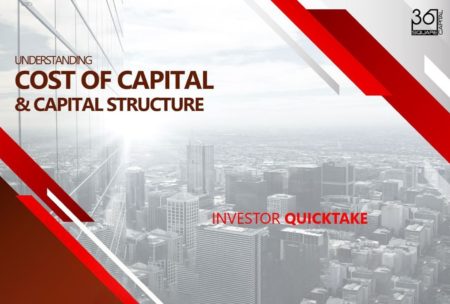Master cost of capital and capital structure, understand equity vs debt, and calculate returns. Gain investment skills with our course. Read more.
My name is Candi Carrera. Born in 1972, I have been a value investor since 2001 with 90% of my personal savings invested in blue chip companies. One of my core principles is to never borrow money when investing in the stock market. I keep the remaining 10% as a permanent cash reserve to buy more stocks when markets get irrational & depressed which happens regularly. At the age of 50 and thanks to value investing learned from Warren Buffet & Benjamin Graham, I was able to "retire" and live tod
Buy this course for $199 $10
and keep lifetime access.
Access all courses in our library for only $9/month with All Access Pass
About This Course
Who this course is for:
- Investors analyzing the financial performance of companies
- Investors comparing the cost of capital and capital structure with Return on Invested Capital (ROIC)
- New board directors trying to understand ROIC expectations of shareholders
What you’ll learn:
- Understanding the cost of capital and capital structure
- Differences between the cost of equity and debt
- Determining your expected return when investing your money
- Calculating the cost of capital for a public equity company
Requirements:
- Have a basic understanding of financial concepts
- Be familiar with assets, debt, and equity on a balance sheet
- Understand the difference between bonds and stocks
This investor quicktake course offers a straightforward understanding of the cost of capital and capital structure, why capital incurs costs, and how to calculate it. You will also learn about the risk-return tradeoff between different asset classes (debt vs. equity).
By the end of this course, students will be able to differentiate the risks between various asset classes. We will practice calculating the cost of capital for companies such as Microsoft, Apple, Richemont, and Kering. We will also compare the expected cost of capital with the actual ROIC performance for these companies.
The objective of this course is to help you grasp the essence of the cost of capital in a short period (approximately 1 hour).
Investing in stocks and acting as a business owner can be transformative. Learn from my 20 years of experience as an investor managing my own investment fund and quickly advance with the knowledge I will share.
Thank you for your interest in my course! I hope you enjoy it.
Candi Carrera
The answer is here! Find the course that propels you to success. Visit my course library!
Our Promise to You
By the end of this course, you will have learned about and understood the cost of capital and capital structure.
10 Day Money Back Guarantee. If you are unsatisfied for any reason, simply contact us and we’ll give you a full refund. No questions asked.
Get started today and learn more about the cost of capital and capital structure!
Course Curriculum
| Section 1 - Introduction And Lecture Videos | |||
| Course Handbook - Cost of Capital | 00:00:00 | ||
| Introduction | 00:00:00 | ||
| Exchange Of Money | 00:00:00 | ||
| Returns Per Asset Class | 00:00:00 | ||
| Why Equity Investments vs Debt | 00:00:00 | ||
| Return On Invested Capital | 00:00:00 | ||
| Practical Examples And Conclusion | 00:00:00 | ||
About This Course
Who this course is for:
- Investors analyzing the financial performance of companies
- Investors comparing the cost of capital and capital structure with Return on Invested Capital (ROIC)
- New board directors trying to understand ROIC expectations of shareholders
What you’ll learn:
- Understanding the cost of capital and capital structure
- Differences between the cost of equity and debt
- Determining your expected return when investing your money
- Calculating the cost of capital for a public equity company
Requirements:
- Have a basic understanding of financial concepts
- Be familiar with assets, debt, and equity on a balance sheet
- Understand the difference between bonds and stocks
This investor quicktake course offers a straightforward understanding of the cost of capital and capital structure, why capital incurs costs, and how to calculate it. You will also learn about the risk-return tradeoff between different asset classes (debt vs. equity).
By the end of this course, students will be able to differentiate the risks between various asset classes. We will practice calculating the cost of capital for companies such as Microsoft, Apple, Richemont, and Kering. We will also compare the expected cost of capital with the actual ROIC performance for these companies.
The objective of this course is to help you grasp the essence of the cost of capital in a short period (approximately 1 hour).
Investing in stocks and acting as a business owner can be transformative. Learn from my 20 years of experience as an investor managing my own investment fund and quickly advance with the knowledge I will share.
Thank you for your interest in my course! I hope you enjoy it.
Candi Carrera
The answer is here! Find the course that propels you to success. Visit my course library!
Our Promise to You
By the end of this course, you will have learned about and understood the cost of capital and capital structure.
10 Day Money Back Guarantee. If you are unsatisfied for any reason, simply contact us and we’ll give you a full refund. No questions asked.
Get started today and learn more about the cost of capital and capital structure!
Course Curriculum
| Section 1 - Introduction And Lecture Videos | |||
| Course Handbook - Cost of Capital | 00:00:00 | ||
| Introduction | 00:00:00 | ||
| Exchange Of Money | 00:00:00 | ||
| Returns Per Asset Class | 00:00:00 | ||
| Why Equity Investments vs Debt | 00:00:00 | ||
| Return On Invested Capital | 00:00:00 | ||
| Practical Examples And Conclusion | 00:00:00 | ||



